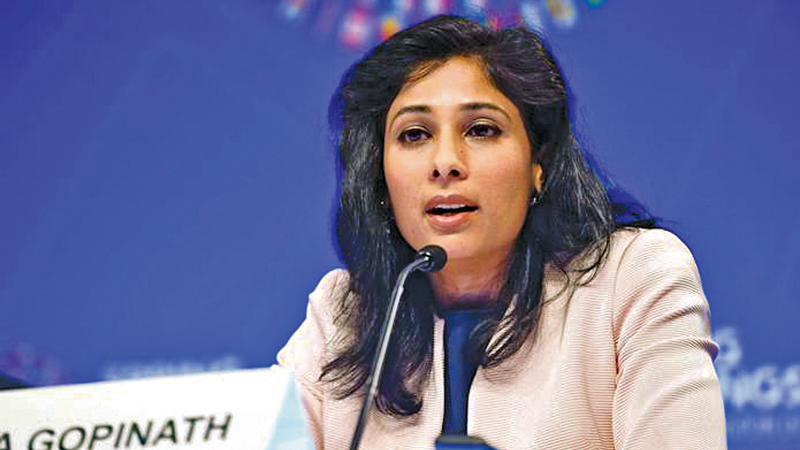IMF First Deputy Managing Director IMF First Deputy Managing Director (FDMD) Gita Gopinath hailed Sri Lanka’s resilience and progress made during its toughest times of economic turmoil that sent the economy into a tailspin three years ago.
She was speaking at the conference on “Sri Lanka’s Road to Recovery: Debt and Governance” in Colombo last week.
Gopinath said Sri Lanka’s experience stands out — both for the severity of the crisis the country experienced three years ago, and the remarkable progress that has been achieved in a very short time.
The crisis was precipitated by years of declining tax revenues, depleted foreign exchange reserves and an explosive and unsustainable increase in public debt as growth collapsed. There were long lines for fuel, severe shortages of basic goods, record inflation, and widespread power outages. For many households, daily life became an exercise in hardship.
Today, thanks to bold reforms and the commitment of the people, substantial progress has been made to restore macroeconomic stability and reduce hardships faced by people.
Fuel, cooking gas, and medicines are available again. Inflation has been brought under control and economic growth has returned — expanding by 5 percent in 2024. On the fiscal front, the Government has achieved an extraordinary adjustment and tax revenues have increased by more than two-thirds as a share of GDP. She said Sri Lanka also took the difficult but necessary decision to default on its public debt and pursue a sovereign debt restructuring. These decisive actions on debt have helped ease the burden on the country. External creditors have forgiven $3 billion in debt and restructured another $25 billion, extending repayment over two decades at lower interest rates. Sri Lanka’s bonds are once again included in global indices, and its credit rating has improved.
However, Gopinath said that there is a lot that is still needed. Poverty rates at 24.5 percent in 2024, according to the latest World Bank estimates, are too high and need to be brought down quickly. This requires continued macroeconomic stability and successful implementation of structural reforms. Tackling corruption will require major reforms. Implementing the government’s action plan on governance reforms is critical. While much has been done to reduce external debt, domestic debt is still high and steadfast implementation of sound fiscal policy is critical to continue bringing it down. None of this will be easy. The global environment is also difficult with tariffs, geopolitical conflict and economic fragmentation posing major risks for small open economies like Sri Lanka’s.
This is why there is no room for policy errors. As the IMF Managing Director said during our Spring Meetings in April: the choice facing countries today is between reform and regret. Between building buffers — or risking future crises.
“Sri Lanka’s reform program has delivered strongly. But history reminds us of the risks. Of the 16 IMF programs Sri Lanka has engaged in over the years, about half ended prematurely. Often, reform fatigue sets in. Hard-earned gains were reversed. Growth faltered. The country cannot afford to repeat that cycle,” the IMF’s Deputy Managing Director said while emphasizing how essential it is to sustain the reform momentum, and in a manner that is inclusive and accountable.
“Public dialogue matters. Transparency matters. Engaging civil society and listening to diverse voices — not just in Colombo, but across the island — will help ensure that policies are responsive and responsible. This conference is exactly the kind of platform that can foster such engagement. It is a space to reflect, to challenge assumptions, and to build consensus. The IMF will remain a steadfast partner as Sri Lanka pursues stable and inclusive growth that improves the lives of all citizens and future generations,” she said.






